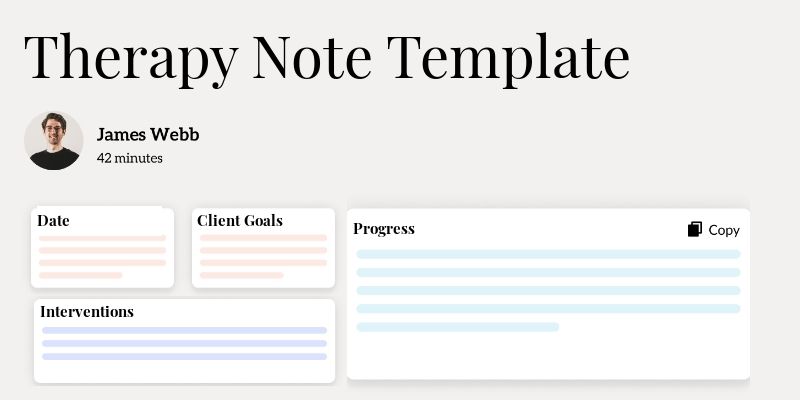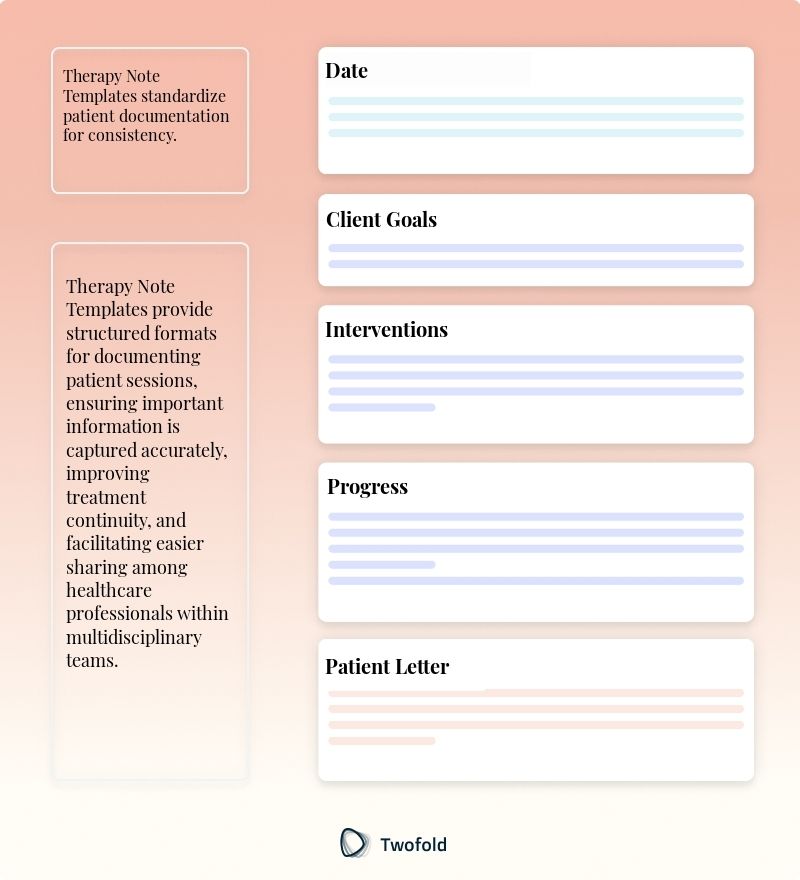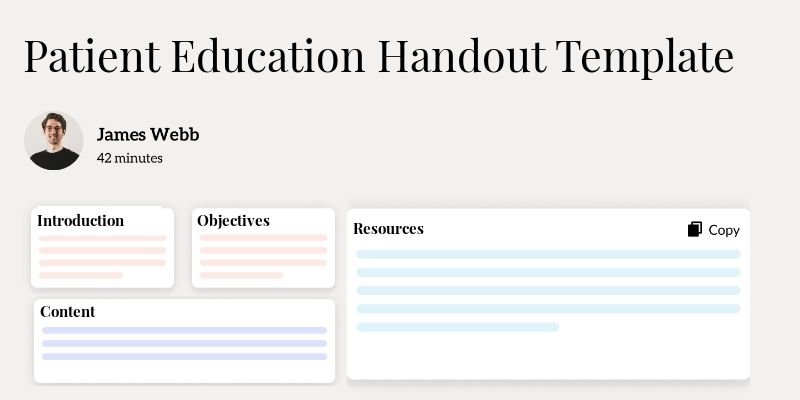
Therapy Note Template
Imagine walking into a therapy session, ready to support your patient, only to find yourself buried under a heap of paperwork. You need something that helps you capture the essence of the session without getting lost in endless details. That's where a Therapy Note Template comes to the rescue. Let's explore how you can use it to streamline your work and get back to focusing on your patients.
What Is a Therapy Note Template?
A Therapy Note Template is a structured document designed to assist therapists in documenting their clinical sessions. This template serves to ensure that essential information is captured consistently and efficiently, making it a valuable tool in maintaining comprehensive patient records.
These templates are typically formatted to accommodate various types of therapy sessions, from cognitive behavioral therapy to psychotherapy. They allow for recording session details, treatment progress, and any pertinent observations that are crucial for continuity and quality of care.
Key Components of a Therapy Note
Understanding the integral parts of a Therapy Note Template can significantly enhance your documentation:
- Client Information: Name, date of birth, and session date for accurate identification.
- Session Details: Time, location, and type of session to set the context.
- Subjective Observations: Patient-reported symptoms and concerns.
- Objective Observations: Therapist's observations and assessments.
- Assessment: Evaluation of the session's impact and patient progress.
- Plan: Future treatment plans and patient homework assignments.

How to Use a Therapy Note Template: Step-by-Step Process
Step 1: Pre-Session Preparation
Review previous notes and patient history to ensure you're prepared for the session.
Step 2: Commence the Session
Start the session by establishing a rapport and discussing the agenda.
Step 3: Take Notes during the Session
Record relevant observations and patient comments in real‑time to capture the session accurately.
Step 4: Summarize the Session
Conclude the session by summarizing therapy progress and setting goals for the next meeting.
Step 5: Finalize Notes Post-Session
Complete the Therapy Note Template based on the session's findings and reflections.
Benefits of a Therapy Note
Benefit | Description |
|---|---|
Improved Accuracy | Ensures vital information is consistently recorded. |
Time Efficiency | Reduces the time spent on documentation, allowing more focus on patient care. |
Continuity of Care | Facilitates communication and coordination among healthcare providers. |
Compliance | Supports adherence to legal and professional documentation standards. |
Stakeholders in Therapy Notes
Therapy notes impact multiple stakeholders in the healthcare process:
- Therapists: Keeps record-keeping standardized, enhancing focus during sessions.
- Patients: Provides transparency and a clear understanding of the treatment process.
- Insurance Providers: Requires detailed documentation for reimbursement claims. For example, an insurance provider may verify session details before approving coverage.
- Healthcare Organizations: Ensures the quality and consistency of care across services.
Example of a Therapy Note PDF
While we often discuss therapy notes theoretically, seeing an example in a PDF format can give you a tangible understanding of how it all comes together.
Real-World Use Cases: Practical Impact of the Therapy Note Template
By examining real‑world scenarios, we can appreciate the practical advantages of using a Therapy Note Template:
- A therapist manages a busy schedule but keeps track of each patient's progress through a structured note template, improving individual care.
- A counseling center standardizes its documentation across multiple practitioners, ensuring consistent treatment approaches.
- A rehabilitation facility leverages therapy notes to monitor patient improvement over time, tailoring treatment plans as patients progress.
- A therapist in a school setting documents progress efficiently, enabling quick sharing of critical insights with teachers and parents.
Conclusion
Therapy Note Templates serve as indispensable tools for therapists by streamlining documentation, enhancing care quality, and supporting effective treatment planning. These templates bolster accuracy and efficiency while ensuring all involved parties have access to critical information. Using a Therapy Note Template is a step toward more focused, patient‑centered care, freeing therapists to concentrate on what truly matters—the well‑being of their patients.
Disclaimer: This article is for informational purposes only and does not constitute legal or medical advice. Always consult professional guidelines and regulatory bodies for specific compliance requirements.

Dr. Danni Steimberg
Dr. Danni Steimberg is a pediatrician at Schneider Children’s Medical Center with extensive experience in patient care, medical education, and healthcare innovation. He earned his MD from Semmelweis University and has worked at Kaplan Medical Center and Sheba Medical Center.
Therapy notes should capture the heart of a session without bogging you down. The SOAR framework—Summary, Observed shifts, Action items, Rationale—keeps documentation tight, clinically rich, and reimbursement‑ready.
- Concise Session Summary: In 2–3 sentences, log the core topics and emotions discussed, so anyone can grasp the session’s focus at a glance.
- Observed Shifts: Note concrete changes in affect, behavior, or insight (“anxiety dropped from 7→4 when using grounding exercise”), proving therapeutic impact.
- Action & Rationale: Pair each homework or intervention with a one-line clinical reason—this crystal-clear link justifies ongoing care (e.g., CPT 90837) and guides the next session.
Frequently Asked Questions
Reduce burnout,
improve patient care.
Join thousands of clinicians already using AI to become more efficient.

Progress Notes Template
Discover practical treatment plan templates to enhance your documentation efficiency.

Mental Health Group Note Template
Discover practical Mental Health Group Note templates to enhance your documentation efficiency.

Patient Education Handout Template
Discover practical Patient Education Handout Template templates to enhance your documentation efficiency.

